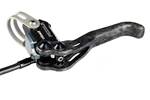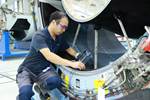American Airlines partners with Safran to reduce environmental footprint with lighter, more efficient brakes
Boeing 737NG fleet will be upgraded with carbon fiber brakes to enhance operational performance and reduce operating costs while maintaining sustainability commitments.
From left to right: Simon Gavillet (VP sales, marketing and commercial support, Wheels and Brakes Division - Safran Landing Systems); Luc Philippe (sales and marketing director - Safran Landing Systems); Kris Sorge (manager, strategic sourcing and contracts, technical operations - American Airlines); Mike Hanson (director, supplier management - American Airlines); Cédric Goubet (CEO - Safran Landing Systems); Kevin Brickner (senior VP, technical operations - American Airlines); Craig Harry (managing director, technical operations supply chain - American Airlines); Mark Miner (VP, technical services - American Airlines); Nicolas Potier (EVP, Wheels & Brakes Division - Safran Landing Systems); David Ternisien (programs director, Wheels & Brakes Division - Safran Landing Systems). Photo Credit: Safran
As part of its commitment to minimize the environmental impact of air travel, American Airlines (Fort Worth, Texas, U.S.), reported to be the world’s largest operator by fleet size, has partnered with Safran Landing Systems (Vélizy-Villacoublay, France) to upgrade its Boeing 737NG fleet from steel to carbon fiber brakes, representing more than 300 aircraft currently in operation.
Lighter than steel brakes, with up to 700 pounds (320 kilograms) of weight savings per aircraft, this upgrade to the Safran Landing Systems carbon fiber brakes configuration will help American meet its sustainability commitments by reducing its greenhouse gas (GHG) emissions by 77 tons per Boeing 737NG aircraft every year.
Thanks to its high energy absorption capabilities and twice the endurance of the steel configuration, the Safran Landing Systems brake, compatible with Boeing 737NG and Boeing 737 MAX families, provides operators with a significant improvement in operational performance and is said to deliver the lowest operating costs on the market.
This initiative highlights Safran Landing System’s and American’s common sustainability values and reinforces a shared commitment of playing a leadership role in helping decarbonize the broader airline industry and meeting the aviation industry goal of net-zero GHG emissions by 2050.
“Ensuring our existing fleet — the youngest among U.S. network carriers — is operating as efficiently as possible is critical to reaching our climate goals,” Kevin Brickner, American Airlines senior vice president of technical operations, says. “Reducing our flight weight with a superior braking product is a win-win for our operation.”
Cédric Goubet, Safran Landing Systems CEO, adds that the collaboration is a “great opportunity for Safran Landing Systems to increase its presence in the U.S. market and expand the growing activity of its Walton site.”
Safran Landing Systems will manufacture the wheels and carbon fiber brakes and perform the carbon heat sinks exchanges in its state-of-the art production plant in Walton, Ken., U.S., which has more than 350 highly qualified employees. American’s technical operations team will complete the maintenance, repair and overhaul (MRO) services at its base maintenance facility in Tulsa, Okla., U.S.
This contract is provided under Landing Life, the support and services offer which covers all Safran Landing Systems’ after-sales business.
Related Content
-
The lessons behind OceanGate
Carbon fiber composites faced much criticism in the wake of the OceanGate submersible accident. CW’s publisher Jeff Sloan explains that it’s not that simple.
-
Recycling end-of-life composite parts: New methods, markets
From infrastructure solutions to consumer products, Polish recycler Anmet and Netherlands-based researchers are developing new methods for repurposing wind turbine blades and other composite parts.
-
Plant tour: Albany Engineered Composites, Rochester, N.H., U.S.
Efficient, high-quality, well-controlled composites manufacturing at volume is the mantra for this 3D weaving specialist.

















